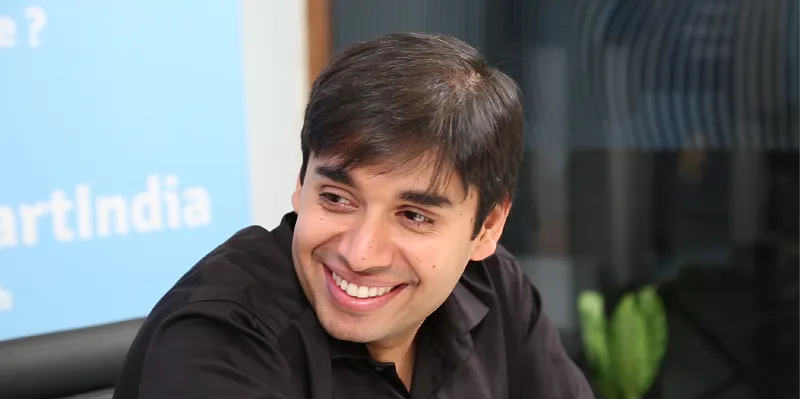Naveen Tewari spills the beans on how InMobi retains top talent
InMobi has found itself amidst a swirl of rumours in recent months ranging from money troubles to being an acquisition target. While it remains to be seen how India’s first startup Unicorn will evolve on the business front, it is also true that it has built an enviable people organisation.
InMobi has seen some of its top talent leave in the past few years, but the churn is much less compared to some of its peers like Flipkart. This, the company and HR experts say, is due to a set of policies and initiatives the Bengaluru-based Adtech firm implemented over the past five years.

Valuing in-house talent
To us the main theme is that we value our talent a lot. There should not be any one better outside. One of the facets is growing them within the organisation. We started investing in this four to five years ago, and now we can reap the benefits. That is why you don't see us going outside for talent versus growing people internally as much as possible. We feel it is an investment you have to make over a long period of time,” says Naveen Tewari, Co-founder and CEO of InMobi.
In the 2011-12 period, the task before InMobi, from a talent point of view, was to:
1. Attract top talent
2. Retain this talent
But Naveen, his co-founders and some senior InMobi executives realised that the overall culture would have to be different from what other corporates were doing. “We realised we were living in this corporate world and were getting shaped into what the corporate world expected us to be and not what we as InMobi wanted to be,” recalls Naveen, who was previously an Analyst with consulting firm McKinsey & Company and an Associate with investment firm Charles River Ventures, before founding InMobi in 2008.
So the company decided to do away with bonuses, annual ratings, travel budgets and other such policies that regulate employees in many a corporate. “When we first decided to try this out, we were very scared,” says Naveen. “But we thought Sahi lag raha hai. Kari dete hain. (This feels right. Let’s do it.)”
The Founders Staff programme
However, the programme that has had the most impact on growing talent internally, at super speed, did not originate as a well-thought out plan. The Founders Staff programme was a result of Naveen feeling, in 2009, the need for someone who would work with him closely on projects. Naveen did have a team of managers, but they already had their assigned work and tasks. “I needed someone to help with my work,” says Naveen. This was when InMobi was transitioning from mKhoj, an SMS-based search engine. Abhishek Patil joined Naveen’s team to be his ‘right-hand’.

Abhishek worked on strategic initiatives, which essentially meant the new markets that InMobi was planning to enter. InMobi, for which US and China are the largest markets, went global really early. And it was Abhishek who did the market research and analysis that helped Naveen decide which markets to enter. Abhishek, who was 26 years at the time, and had just finished his MBA from the University of Notre Dame, found himself setting up the ops end-to-end in Japan and South Korea. Abhishek left InMobi is 2011 with a plan to start his own venture and today runs Oliveboard, an e-learning startup. Abhishek credits InMobi for giving him the confidence to startup.
“I come from a family business background, so expectation was to become an entrepreneur. But after an MBA, I was not ready. But the InMobi experience gave me great perspective on how a tech business is done, and how an organisation functions. I got the risk-taking appetite,” says Abhishek.
In fact, Naveen proudly says:
We have an over 90 per cent success rate in Founders Staff. I have never lost out a Founders Staff to another company, only to their own startup.
An HR Consultant, who works closely with InMobi and other fast-growing startups, says, “InMobi has done the career progression and job rotation pieces very well. They have implemented well on the ground. It is the recent troubles in the Adtech industry that are making people leave, not the company itself and that’s an achievement.” The consultant didn’t want to be identified as he works with InMobi.

It was the success Abhishek had at InMobi that led to the formation of Founders Staff as a full-fledged programme. Today, around 10-12 fresh hires work with the founders and a few other senior executives for a period of 12 to 18 months before being placed in a role of their own.
The attraction for the hires is a fast-track career. Take Innu Nevatia, 32, for instance. Today, she is VP, Global Revenue Delivery, Performance Business at InMobi. She passed out of ISB in 2010 and joined the Founders Staff immediately. In the almost two years she spent within the programme, Innu completed multiple projects such as launching in new markets and working on closing the $200 million Softbank deal in 2011.
“I landed my current role at least two years before I would have if I followed the regular path. Founders Staff helps you get a helicopter view of the entire business; you get a short-term and long-term view. You get to work with different teams, and understand within a short span of time how different parts of the company come together to make this work,” says Innu.
So, what’s the overall impact of a programme like this? Why is such a programme, where untested talent is given big responsibilities, important for a growing startup? Naveen says the impact is two-fold. The company gets to understand a person’s competencies and interests better as he or she is working on many different projects. A programme like this places the individual in a role of responsibility that they fit in very quickly. “The previous generation in the workforce was very loyal, but that's not the case right now. That's because people want hyper growth. How do we give hyper growth to people who come in here and come from privileged backgrounds?” asks Naveen. The other advantage is that such individuals understand the company very well and become deeply entrenched.
We also have a very strong bias in our executive team to grow people from within. Over the last two to three years, we have added only one or two people from outside (at that level). Everyone else is from within,” says Naveen.
Live your potential
This is another programme that has helped InMobi retain talent. Many companies say, at least on paper, that people can move across functions easily within an organisation. But this is rarely the case in practice. InMobi managers realised in 2014 that attrition due to lack of opportunities was going up. So the company decided to open every new role internally first.
“You will ask what is so different from other companies. We do not just display the position internally. We do people analytics. After 13 months in a role, a trigger goes to the employee that shows the various roles that they could be interested in,” says Nandika Pradeep, who manages the Live Your Potential programme. Last year, about 85 positions were closed internally, and Nandika says the company is hoping to close 100 positions internally this year. That is about one-third of total hires in a year.
And these moves are not just at the junior- or middle-management level. Piyush Shah was part of the Business team and now is Chief Product Officer, while Ed Laws was Head of Finance for the Europe, Middle East and North Africa region, but now leads the global performance advertising business.
An initiative that helps the internal job movements is the bridge programme. Here, any team can advertise a short-term project internally, and a staff member can opt to do this part-time over and above their primary responsibility. So a techie can work on a marketing assignment for a few weeks. Not everyone does this to scope out a new role, but it does help get a better understanding of business says Nandika, who recently completed a three-month sales assignment.
Naveen’s top tips:
- Invest in your people for the long term
- Trust your team and give them challenges early
- Allow your staff to experiment to understand what they are really passionate about
- Give your talent new opportunities before they start looking outside for fresh opportunities
- Allow your talent to grow up the management ladder quickly
“Culture has become more important than even revenue. If you want to build a company that will sustain over a long period of time, and will be innovative, then you have to build one with a different environment. We are trying to do that,” concludes Naveen.











